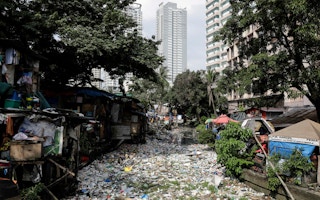The devastation wrought by Super Typhoon Mangkhut, known locally as Typhoon Ompong, has not only claimed lives and destroyed homes, but revealed the scale of the Philippines’ plastic problem as well as the archipelago’s biggest plastic polluters.
To continue reading, subscribe to Eco‑Business.
There's something for everyone. We offer a range of subscription plans.
- Access our stories and receive our Insights Weekly newsletter with the free EB Member plan.
- Unlock unlimited access to our content and archive with EB Circle.
- Publish your content with EB Premium.
A brand audit of plastic waste deposited in Pasig River, a major arterial waterway that runs through the capital Manila, found Philippine food manufactuers Monde Nissin and JBC Food Corporation, and multinational convenience store chain 7-Eleven to be the top three plastic polluters.
Trash-collecting boats provided by Pasig River Rehabilitation Commission, the agency charged with cleaning up the polluted waterway, gathered 1,006 pieces of single-use plastics in just one hour along a stretch of one of Pasig River’s main tributaries.
A brand audit by non-government group Greenpeace revealed the biggest plastic contributor to be Monde Nissin, the maker of noodles, biscuits and packaged baked goods brands, with 8 per cent of the waste collected.
JBC Food Corporation, which produces nuts and seeds snacks, was second with 7 per cent of the waste. Food packaged products manufactured by 7-Eleven made up 6 per cent of the debris.
Indonesian coffee company PT Torabika, and multinational consumer goods firms Nestlé, Mondelez and Unilever also appeared in the top 10 brands in the audit, along with local firms Rebisco Biscuit Corporation, beverage firm Zest-O, and snacks brand Oishi.
The results show many of the same companies that featured in a brand audit of the Philippines’ top marine polluters conducted on an island off the coast of Manila a year ago. They included Néstle, Unilever, PT Torabika, Monde Nissin, Mondelez and Procter & Gamble.
These companies also featured in plastic waste studies of Philippine waterways by the Global Alliance for Incinerator Alternatives and Mother Earth Foundation earlier this year, and in global waste surveys.
The Philippines is the world’s third largest plastic polluting nation, after China and Indonesia, with the capital city the main source of plastic leakage into waterways.
“We need each of us to change our behaviours and reconsider the perception of convenience from single-use plastics. Companies, on the other hand, need to step up and rethink how their products are being packaged and delivered,” said Abigail Aguilar, campaigner for Greenpeace Philippines.
While the country reels from the effects of extreme weather conditions brought about by climate change, Aguilar said that the country is “left with the unfathomable consequences of plastic pollution.”
The Break Free from Plastic movement, of which Greenpeace is a part of, calls for a reduction in the production of single-use plastics by big fast-moving consumer corporations, and for these companies to look for alternative delivery systems, packaging and design.
Some of the world’s biggest consumer goods companies have responded to the plastic pollution problem with measures to curb their impact. A group of large brands, including L’Oréal, Mars, PepsiCo, and Coca-Cola, have committed to make all of their packaging reusable, recyclable or compostible by 2025.

















